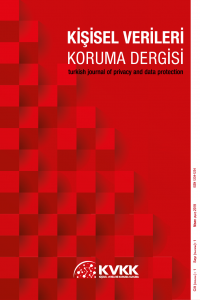Bankacılık Sektöründe Kişisel Verilerin Korunması ve Müşteri İlişkileri Yönetimi
Çalışmada düzenlemeleri halen devam eden ve nispeten yeni olan Kişisel Verilerin Korunması Kanunu’nun bankaların faaliyetleri üzerindeki yansımaları incelenmiştir. İncelemede Kişisel Verilerin Korunması Kanunu kapsamında, bankacılık sektörü için kişisel veriler, bu verilere duyulan ihtiyaç ve bu verilerin işlenmesi, ekonomi politik açısından ele alınmıştır. Konu hakkında literatürde yer alan çalışmalar ve bankaların araştırmalarına dair, alan taraması yapılmıştır. Kişisel verilerin korunmasına ilişkin teorik çerçevenin açıklanmasına ilave olarak bankaların kişisel verilerin korunmasında karşılaştıkları kritik hususlara yer verilmiştir. Bankaların mevcut ve potansiyel müşterilerinden elde edecekleri kişisel verilerin doğru işlenmesinin, kritik bir unsur olduğu ve mevzuatın ihmali halinde bundan bankaların olduğu kadar müşterilerinin de önemli kayıplarla karşılaşabilecekleri değerlendirilmiştir. Kişisel verilerin doğru kullanımının sektörün gelişmesine olduğu kadar ekonominin genelinde de iyileşme ivmesi oluşturduğu, böylece toplum refahına önemli katkıda bulunduğu sonuç olarak değerlendirilmiştir. Ayrıca bankacılık sektörünün kişisel verilere gösterdiği duyarlılıktan hareketle, müşteri ilişkileri yönetimine dair tespit ve önerilerde bulunulmuştur.
Anahtar Kelimeler:
Kişisel Verilerin Korunması, Bankacılık Sektörü, Kişisel Verilerin İşlenmesi
Protection of Personal Data in The Banking Sector and Customer Relationship Management
In this study, the reflections of the relatively new Personal Data Protection Law on the activities of the banks, which are still under regulation, are examined. Within the scope of the Law on the Protection of Personal Data, personal data for the banking sector, the need for these data and the processing of data are discussed in terms of economic policy. Field surveys about the studies in the literature and banks' researches are conducted on the subject. In addition to the explanation of the theoretical framework for the protection of personal data, the critical issues faced by banks in the protection of personal data are also included. It has been assessed that the correct processing of personal data that banks will obtain from their existing and potential customers is a critical element and that, as far as the legislation is concerned, customers as well as the banks may experience significant losses. It is considered that the correct use of personal data creates an acceleration of recovery in the economy as well as the development of the sector and thus contributes significantly to the welfare of the society. In addition, based on the sensitivity of the banking sector to personal data, determinations and recommendations are made regarding customer relationship management.
___
- AB. (1995), “Directive 95/46/EC of the European Parliament and of the Council of 24 October 1995 on the Protection of Individuals with Regard to the Processing of Personal Data and on the Free Movement of Such Data”, OJL 281, 23.11.1995, 31-50.
- Açıkgöz, O., (2016) Kişisel Verilerin Hukuka Aykırı Şekilde Elde Edilmesi ve İnternet Bankacılığında Kullanılması Sonucu Malvarlığı Zarara Uğratılan Bankaya Karşı Mevduat Sahibinin Hukuki Sorumluluğu, Marmara Üniversitesi Hukuk Fakültesi, Hukuk Araştırmaları Dergisi, Cilt:22, Sayı:1, İstanbul.
- Amani, F. A., & Fadlalla, A. M. (2017). Data mining applications in accounting: A review of the literature and organizing framework. International Journal of Accounting Information Systems, 24, p. 32-58.
- Bulut, F. (2019). Bankacılık Sektöründe Yeni Özniteliklerle ve Makine İlişkileri Yönetiminin Zenginleştirilmesi. Avrupa Bilim ve Teknoloji Dergisi Sayı 16, s. 382-394, Ağustos 2019
- DeCew, J. (1997). In pursuit of privacy: Law, ethics, and the rise of technology. Cornell University Press.
- Dülger, M.V., (2018). Kişisel Verilerin Korunması Hukuku. İstanbul: Hukuk Akademisi Yayınevi.
- Erdoğdu, A. (Aralık 2018). Bankacılık Sektöürnde Kişisel Veri Güvenliği Üzerine Bir İnceleme. EYSAD (Ekonomi Yönetim ve Sosyal Araştırmalar Dergisi, Cilt 4, No:1, S.1-10.
- Hasan, A. A. T. (2018). Customer Relationship Management (CRM) Practices of City Bank in Customer Retention Perspective in Bangladesh. Global Journal of Management And Business Research.
- John, S.N., Anele, C., Kennedy, O.O., Olajide, F.,& Kennedy, C. G.,(2016) Realtime Fraud Detection in the Banking Sector Using Data Minin Techniques/ Algorithm In Computational Science and Computational Intelligence (CSCI), International Conference on IEEE. P.1186-1191.
- Kartal, M.T.(2018). Kişisel Verilerin Korunması: Türk Bankacılık Sektörü Üzerine Kavramsal Bir Değerlendirme, Uluslararası Ekonomi ve Yenilik Dergisi, 4 (1) 2018, 1-18 Kasemsap, K. (2018). Facilitating customer relationship management in modern business. InEncyclopedia of Information Science and Technology, Fourth Edition(pp. 1594-1604). IGI Global.
- KVKK. (2016), 6698 sayılı, 07.04.2016 tarihli ve 29677 sayılı Resmi Gazete.
- Nguyen, N. T., Hoang, D. H., Hong, T. P., Pham, H., & Trawiński, B. (Eds.). (2018).Intelligent Information and Database Systems: 10th Asian Conference, ACIIDS 2018, Dong Hoi City, Vietnam, March 19-21, 2018, Proceedings(Vol. 10751). Springer.
- Şimşek, Oğuz, (2008), Anayasa Hukukunda Kişisel Verilerin Korunması, 1. Baskı, İstanbul: Beta Basım.
- Tam, P. T., & Van Thuy, M. B. (2017). The Industry 4.0 Factor Affecting The Service Quality Of Commercial Banks In Doing Nai Province. European Journal of Accounting Auditing and Finance Research, 5(9), 81-91.
- Van M., Çaylak B. (2018). Kişisel Verilerin Korunması Kanunu ve Uyum Süreci. http://www.mertvan.av.tr/index.php?option=com_content&view=article&id=134:kvkk-nin-bankacilik-sektorune-etkileri&catid=38:kisisel-verilerin-korunmasi-kanunu-ve-uyum-sureci&lang=en&Itemid=105. E.T.:20.10.2019
- Yüksel, S., Dinçer, H. ve Hacıoğlu, Ü. (2015), “CAMELS-based Determinants for the Credit Rating of Turkish Deposit Banks”, International Journal of Finance & Banking Studies, 4(4), 1-17.
- Zerbino, P., Aloini, D., Dulmin, R., & Mininno, V. (2018). Big Data-enabled customer relationship management: A holistic approach.Information Processing & Management,54(5), 818-846.
- ISSN: 2667-6524
- Yayın Aralığı: Yılda 2 Sayı
- Başlangıç: 2019
- Yayıncı: Kişisel Verileri Koruma Kurumu
Sayıdaki Diğer Makaleler
Bankacılık Sektöründe Kişisel Verilerin Korunması ve Müşteri İlişkileri Yönetimi
E-Gizlilik Tüzük Taslağının Son Versiyonu Üzerine Düşünceler
Leyla KESER BERBER, Ayça ATABEY, Melis MERT
Kişisel Verilerin Korunmasının Vergi Mahremiyeti ile Etkileşimi
Aslihan KART, Muammer KETİZMEN
GDPR Uyumluluk Hazırlığı için bir Araç Olarak Mahremiyet Etki Değerlendirmesi
Bilgin METİN, Sema ERKAN, İdil ATASU, Enes YILMAZ
Veri Sorumlularının Aydınlatma Yükümlülüğü -Avrupa Birliği ve Türk Hukukunda-
